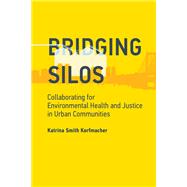Bridging Silos Collaborating for Environmental Health and Justice in Urban Communities
, by Korfmacher, Katrina Smith- ISBN: 9780262537568 | 0262537567
- Cover: Paperback
- Copyright: 8/27/2019
Low-income and marginalized urban communities often suffer disproportionate exposure to environmental hazards, leaving residents vulnerable to associated health problems. Community groups, academics, environmental justice advocates, government agencies, and others have worked to address these issues, building coalitions at the local level to change the policies and systems that create environmental health inequities. In Bridging Silos, Katrina Smith Korfmacher examines ways that communities can collaborate across systems and sectors to address environmental health disparities, with in-depth studies of three efforts to address long-standing environmental health issues: childhood lead poisoning in Rochester, New York; unhealthy built environments in Duluth, Minnesota; and pollution related to commercial ports and international trade in Southern California.
All three efforts were locally initiated, driven by local stakeholders, and each addressed issues long known to the community by reframing an old problem in a new way. These local efforts leveraged resources to impact community change by focusing on inequities in environmental health, bringing diverse kinds of knowledge to bear, and forging new connections among existing community, academic, and government groups.
Korfmacher explains how the once integrated environmental and public health management systems had become separated into self-contained “silos,” and compares current efforts to bridge these separations to the development of ecosystem management in the 1990s. Community groups, government agencies, academic institutions, and private institutions each have a role to play, but collaborating effectively requires stakeholders to appreciate their partners' diverse incentives, capacities, and constraints.







